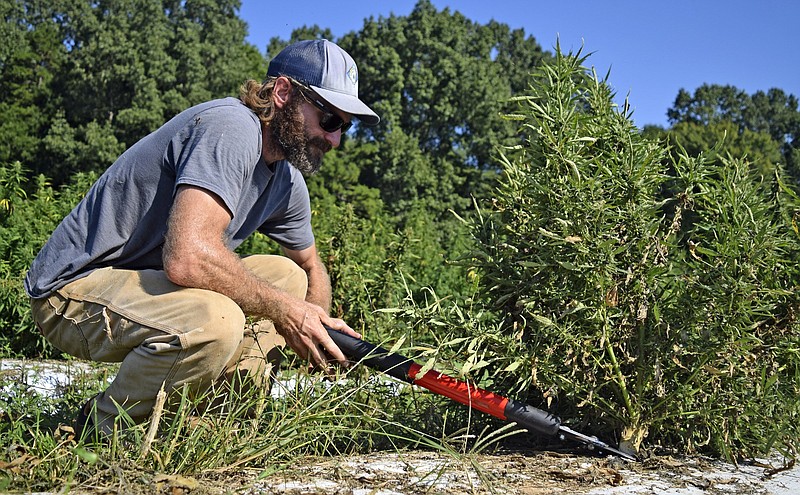The hemp industry took root in a big way in 2019, sprouting businesses across Tennessee, and many people are betting on that trend to accelerate in 2020 despite some growing pains.
"The promise of hemp is enormous," says John Kerns, co-founder and CEO of New Bloom Labs in St. Elmo. "Hemp has the potential to be a new tobacco industry in the Southeast, and Chattanooga is well-positioned to be an Eastern epicenter for the hemp industry."
Tennessee launched a pilot program for hemp farming in 2015, and 44 farmers signed up to grow the crop. In 2019, more than 3,800 people had licenses with the Tennessee Department of Agriculture to farm 51,000 acres of hemp in the state.
The tipping point came in late 2018 with the passage of the federal farm bill that cleared the way for the legal farming and processing of hemp across the United States. Hemp farms popped up like, well, weeds across Tennessee. Businesses that process, test and sell hemp and hemp products quickly followed.
"We grew more hemp in 2019 than anyone anticipated," says Katy Kilbourne, a plant pathologist and manager of the hemp program for the Tennessee Department of Agriculture. "There's a lot of hype around hemp, and we want to make sure people do their due diligence - that they know where they'll get their materials, how they'll plant it, store it, harvest it, that they know who their buyers will be."
The state's first hemp auction in Franklin, Tennessee, in late November, fell flat for growers who didn't get the prices they expected for their crop, but that may reflect the novelty of the industry more than its potential, Kerns says.
"My general take is that this commodity really just isn't mature enough marketwise for that method of sale," he says. "It's not like when tobacco was big and you had corporate buyers that needed large volumes. We're just not there yet in hemp."
Hemp is quickly going mainstream, but some people still don't understand that hemp and marijuana are very different plants, Kerns says. While they look identical, hemp contains extremely low amounts of the psychoactive cannabinoid THC, which is the source of a user's high. Labs like the one Kerns launched in June test hemp to ensure it falls within the very low limits of permissible amounts of THC before it's processed.
Llew Boyd, a hemp grower who runs Haygood Farms in Marion County, says the key to growing the right plant is starting with the right seed. "It starts with genetics," he says. "You have to source your seeds from a reputable provider."
Boyd has had people who apparently don't know the difference steal hemp plants from his field, and he has developed a simple method for preventing that.
"We gave law enforcement the gate code, and they go out and patrol the farm," Boyd says.
The primary focus of the hemp trade is on production of CBD, a cannabinoid found in the plant that has a reputation for easing ailments from stress and inflammation to insomnia.
Elisha Millan opened Tennessee's first hemp dispensary in Chattanooga in 2017 after finding significant relief from debilitating illness through CBD and hemp. She and her staff dedicate a lot of time to educating themselves and others though extensive research and study, but they have to walk a fine line in recommending hemp and CBD to customers, Millan says.
"The FDA doesn't allow us to make any medical claims," Millan says. "We talk about my personal story and how it's helped my health. That's a personal conviction of mine based on my own experience."
Millan says she expects 2020 to deliver important progress on the regulatory front when it comes to the hemp industry.
"We'll see rapid change on the legislative front and the FDA trying to catch up after that," she says.
Beyond personal use, hemp has tremendous potential as a fast-growing source of textiles, wood, and even plastics, Kilbourne says. She recently had the chance to handle some hemp wood developed at a fiber processing plant.
"It looks like a bamboo product, highly engineered," she says. "It was so cool. It had my mind racing."

